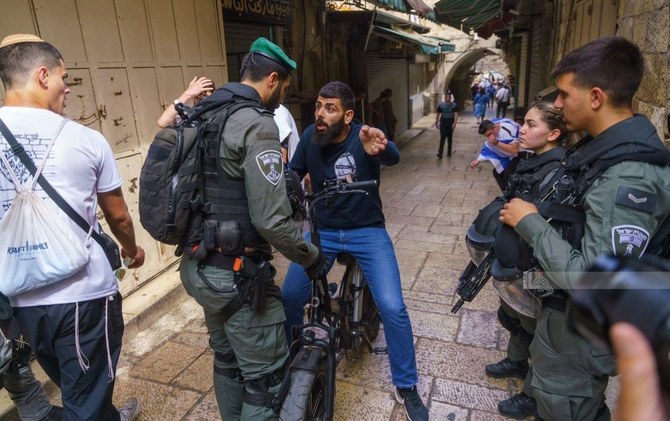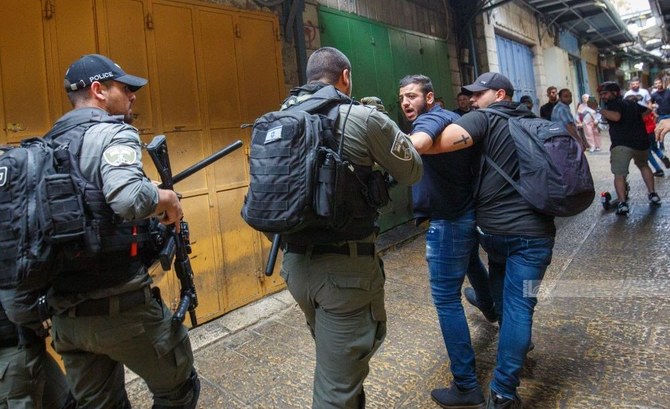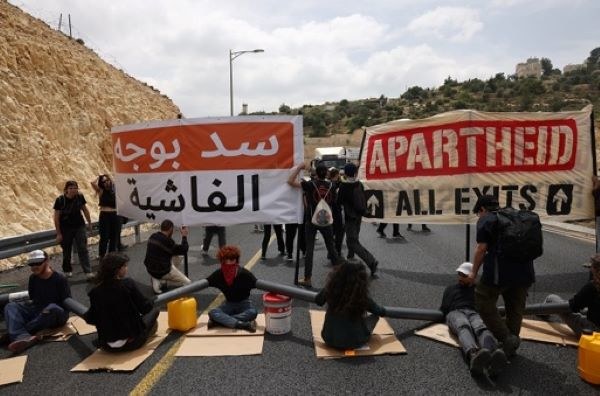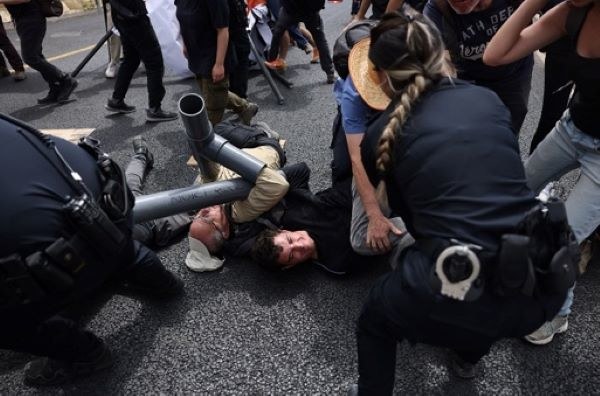RAMALLAH: Thousands of Israeli settlers stormed Jerusalem on Thursday, on the anniversary of the occupation of the eastern part of the city according to the Hebrew calendar.
The “Jerusalem Day” marches began at 2:30 p.m. and reached the Damascus Gate area. The marchers raised Israeli flags, danced, beat drums and sang songs.
Several senior Israeli politicians, including Minister of National Security Itamar Ben-Gvir, Minister of Finance Bezalel Smotrich, Minister of Transportation Miri Regev and the chairman of the Foreign Affairs and Security Committee in the Knesset, Yuli Edelstein, took part in the so-called flag march.
Protected by Israeli police, the marchers assaulted and hurled insults at Palestinian citizens in the Old City and threw stones and waved sticks at press crews near Damascus Gate. They also called for imposing effective Israeli sovereignty over the West Bank and East Jerusalem.
More than 1,200 settlers stormed Al-Aqsa and raised Israeli flags, while police prevented people under the age of 50 from entering the mosque from the predawn prayer until after 3 p.m.
Palestinians said the march was designed to provoke them and wrest control of the eastern part of the city, something the Israelis have been unable to do for the past 56 years.
Israeli authorities regard the more than 350,000 Palestinians who live in the east of the city as residents rather than citizens. About 20,000 Palestinians live in the Old City, alongside 1,100 Israeli settlers.
About 3,200 police imposed a tight siege on Jerusalem, especially in the Damascus Gate area, forcibly removing Palestinian men and women from the street and detaining some. They also restricted movement in the streets around Sultan Suleiman, Nablus and Al-Musrara.
Palestinian Prime Minister Mohammed Shtayyeh condemned the march, describing it as “absurd” and “provocative.”
Nabil Abu Rudeineh, a spokesperson for the Palestinian presidency, said the Palestinian people had legitimacy in Jerusalem, not Israelis or Americans, adding that the flag march was Israeli provocation “that is condemned and rejected.”
He said the US administration “does not give legitimacy to anyone,” and its silence over the Israeli attacks encouraged the occupation forces to persist in their violence against Palestinian people.
Hamas spokesperson Abd Al-Latif Al-Qanua said the extremist Israeli government’s granting permission for settlers to storm Al-Aqsa Mosque and the flag march constituted provocation of Palestinians.
But the march and repeated incursions “cannot change the reality,” he added.
Palestinian resistance groups in Gaza said the march was a failed attempt by Israel to impose its control and sovereignty over Jerusalem.
The march coincided with the 56th anniversary of the occupation of East Jerusalem in 1967.
Imad Muna, one of the most prominent leaders of the Palestinian East Jerusalem community, told Arab News that East Jerusalem and the Old City were almost empty of merchants and shoppers on Thursday.
Even foreigners did not go to the area for fear of violence and clashes between Palestinians and Israeli police who were deployed in great numbers, he said.
About 1,500 shops inside the Old City were forced to close their doors on Thursday to avoid being attacked by the settlers.
“The intensive Israeli security measures and the fear of attacks by extremist settlers paralyzed commerce,” Muna said.
He warned that if the Palestinians tolerated the march this year, then next year, instead of entering the Old City through two gates, the settlers would enter through seven gates.
After 56 years of occupying East Jerusalem, Israel had “failed miserably” in its efforts to Judaize it and tame the Palestinians, Muna said.
“What is the goal of this march, and what do they want to achieve through it? They are trying to prove something they are not convinced of.”





















